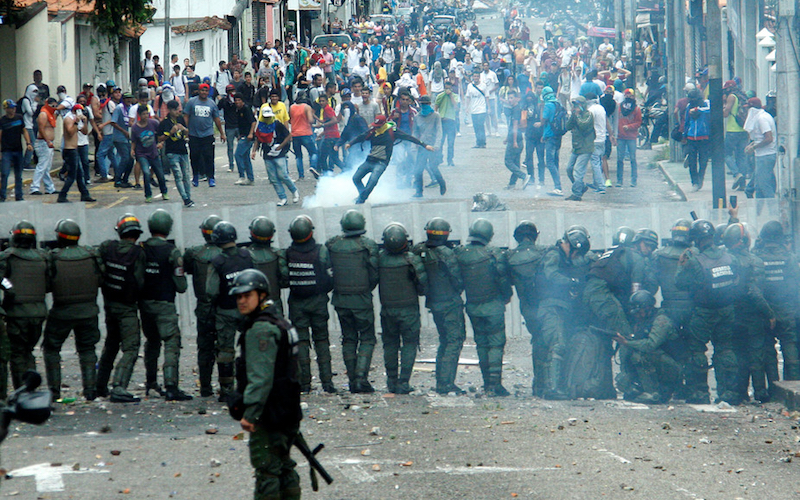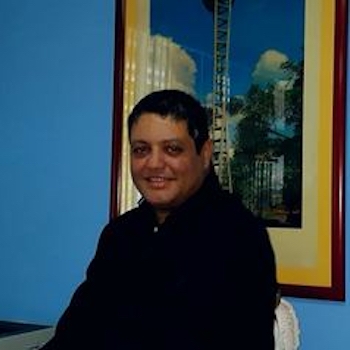
Political Dialogue is a Lost Art in Venezuela and the Vatican’s Intervention won’t Help
For the uninitiated, it is difficult to understand what’s wresting Venezuela apart. For the past year, a convoluted political confrontation – the product of the hardening and mutually exclusive interests held by the government of president Nicolas Maduro and the political opposition – has been roiling on.
With tensions so high and angry, hungry citizens struggling to get by, the Vatican recently launched mesas de discusión, mediated discussions between the two sides.
Given the myriad, deep-set and long-held conflicts facing this country that make dialogue nearly impossible, I fear the proposed talks will make little progress.
A country on the edge
Some of Venezuela’s problems are well reported. It has the region’s worst inflation, food and medicine shortages and newly resurgent poverty-related ailments such as Chagas’ disease and malaria, once vanquished.
What’s less easily discerned from outside is how this decline in citizen well-being also contributes to Venezuela’s political instability.
Ruled by the logic of survival, people are less able to provide input into the functioning of their government. Venezuelans have to stand in long lines to buy basic food (either that or be price gouged by unscrupulous black-market merchants), and it’s common to see people hitting pharmacy after pharmacy until they finally find their diabetes medication or birth control pills.
Citizens are also simply less willing to take part in politics. After so much disappointment, Venezuelans do not trust politicians or their political parties. This lack of confidence, combined with deep polarisation, curtails the efficacy of the democratic system.
These are the fundamental problems that Venezuelans face. But, by all appearances, the political establishment has no idea, or doesn’t care. They’ll talk, but only about the distribution of power: who stays, who goes, and who will do what, when.
Death of the social contract
The modern Venezuelan story starts with Hugo Chavez’s rise to power in 1998, marking the end of the two-party power-sharing system that had kept the country stable but corrupt since 1958. People had lost faith in the capacity of elites to solve problems and to represent their interests, so along came Chavez.
The story of his “21st century socialism” is well known. Chavez, a charismatic individual perfectly suited for political leadership, managed to rally and satisfy the ignored masses over 18 tumultuous years, while breaking basic constitutional principles and alienating the wealthy.
During that time, Venezuela grew increasingly polarised, its social fabric ripping at the seams. Intolerance became part of the political discourse, making it easy to disqualify people who appear to be different from economic or cultural backgrounds.
Today, the social contract is all but nullified.
The current deep conflict began nearly a year ago when the opposition swept parliamentary elections in December 2015. They now hold an absolute majority in the National Assembly.
Venezuela’s heavily oil-based economy was already crumbling. Maduro took power as international oil prices were dipping, and the drop in cash flow has been painful for the country. The government cannot afford to buy goods and services on the international market, further hindering the productivity of an economy that was already hugely dependent on imports.
Today, empty coffers make it impossible for Maduro to satisfy the demands of the public like Chavez used to. This weakens the populism that has long served as social control over the country’s poorest sectors, and foments discontent in the form of impeachment efforts and political violence. Polls in Venezuela are notoriously unreliable, but one in August put Maduro’s approval ratings at around 20%.
Democracy without the people
Since the opposition’s resurgence, the relationship between the National Assembly and executive branches has become more confrontational, even violent. The dynamic is only slightly easing thanks to third-party mediation from the Union of South American Nations and the Vatican.
Venezuelans’ gravest social problems are, of course, linked to this troubled political dynamic. The Pope’s mesas de discusión aim to help the various parties secure an agreement to work toward reducing political conflict and restoring the constitutional regime. But there’s one major problem: it’s all being done without the people.
One look at the agendas makes clear that they’re thinking about political representation and partisan interests, not social representation and the necessities of the populace.
The proposed priority items are: the release of political prisoners, government stability, and the restoration of full powers of the National Assembly, which was recently held “in contempt” by the Supreme Court.
Where’s the social agenda, the solutions around food and medicine and jobs? What’s the date for the next round of elections?
In addition to the distance between the underlying logic and interests of the proposed dialogue and citizens’ urgent needs, the proposed dialogues will reach another impasse due to their inherently limited reach.
Venezuela’s damaged social fabric can’t be fixed by political agreements about administrative functions. For Venezuela to heal, democracy must be restored, and that means citizens must take part in defining the agenda and making decisions.
Power plays
The government and the opposition hold a dichotomous vision about dialogue and its consequences. For president Maduro and the Chavistas, it’s about simply staying in power after a dismal year. For the opposition, the mesas represent a powerful opportunity to deligitimise the leadership and offer themselves as a viable alternative.
This is surely not the peace and reckoning the Vatican hoped for.
By definition, political accords must fulfil at least two conditions. Both sides must be willing to establish mutually beneficial agreements, and each must consider the other a valid interlocutor. Only in this way will dialogue between factions not just reflect partisan preference but also guarantee follow-up and implementation.
Venezuela is set up to fail on both accounts. To succeed, it must establish mechanisms for channelling the needs of broader society in order to reconstruct the healthier, stabler lives Venezuelans once knew. That won’t be easy, and I hope to explore possible solutions in a future article.
In the meantime, citizens won’t even be seated at the Pope’s negotiating table. When the rules of the game are set by those in power, it’s always the people who lose.
This article was originally published on The Conversation. Read the original article.
